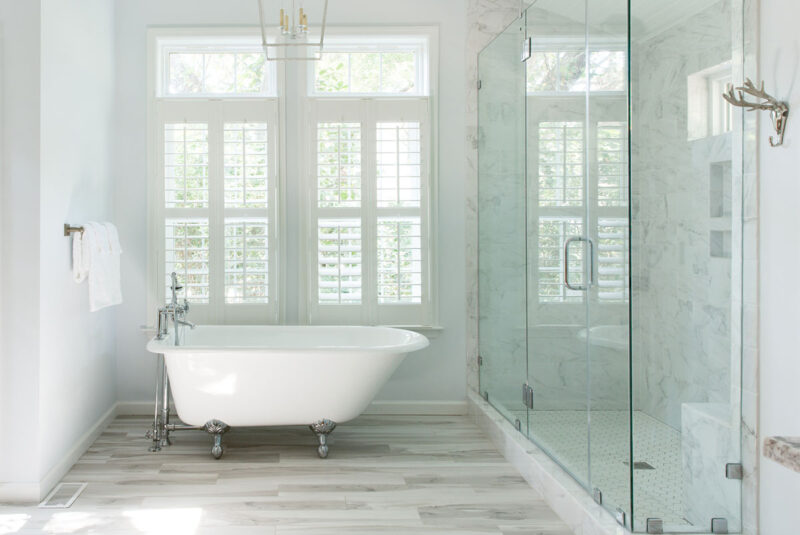Wouldn’t it be awesome if we could give you a yes or no answer? Oh, if only things could be that easy.
Deciding you’re ready to buy a house might seem like a major step. And that would be correct because – spoiler alert – it is. But it doesn’t have to be “meeting your significant other’s parents for the first time” scary.
Asking yourself if you’re ready to buy a house is kind of like asking yourself if you’re ready to walk out the door before you go on a date.
Before you leave, you’ll probably run through a mental checklist of to-do’s: hair, maybe makeup, shower, and the perfect ‘fit. There’s a lot you have to know and decide before you walk out the door.
Buying a home is a lot more complex than finding the right date-night outfit (maybe). There are lots of factors you’ll need to take into consideration before you can commit to buying a home. Most of what you’ll need to take into account fall under two major categories: money and lifestyle.
Commas in Your Bank Account: Am I Financially Ready To Buy a House?
While we can’t tell you the exact amount you’ll need to buy a house, we can confidently tell you that you’ll need some savings stashed away.
Now, while having a nice lump sum of cash is great, your journey doesn’t end there.
There are a few key financial factors that come into play when buying a home.
The 2 words everyone wants to hear: Credit score
Let’s get the fun stuff out of the way first, shall we?
Your credit score is one of the most important factors that play a role in buying a home. That’s why it’s one of the first things you should check when you’re asking yourself if now is the time to get a house.
Your credit score essentially lets lenders know the type of borrower you are. Lenders use your credit score to decide whether you qualify for a mortgage and decide what interest rate you’ll get.
Higher credit score = lower interest rate. Lower credit score … you get the picture.
Lenders will typically accept a minimum credit score that falls somewhere between 620 and 680. Don’t fall into that range? No worries. There are mortgages out there for borrowers with less-than-perfect credit.
Debt-to-income ratio (DTI): I’ll pay you back, I swear
If you’ve already done a little home buying research, chances are that you’ve come across the term debt-to-income ratio. It can be a little confusing, but understanding the way it works and how it gets calculated can go a long way in helping you decide if now is the right time to buy a house.
Lenders calculate your debt-to-income ratio to figure out how much disposable income you have. In other words, lenders want to make sure you have enough money to pay toward your loan each month. First, they add up all your minimum monthly payments. Then they divide that total by your pretax monthly income.
Here are some of the payments that are included in the calculation:
- Rent
- Car loans
- Student loans
- Personal loans
- Credit card payments
These bills can add up pretty quickly. But, luckily, lenders aren’t looking for you to be debt-free.
Typically, lenders prefer a DTI of 36% or less for a conventional mortgage. If you’re wondering where your DTI currently stands, we can help you calculate it.
Money in the bank: Make a down payment
Remember we said that you’d want to have some savings stashed and ready to go to buy a house? Well, here’s why: You’re going to need the money to make a down payment.
When buying a house, you will most likely need to make a down payment to receive a mortgage. What you’re able to pay as a down payment will determine how much you’ll need to borrow from a lender to make up the difference.
When discussing down payments, you’ll hear “20%” come up a lot – and for good reason. Making a down payment of 20% will keep you from paying mortgage insurance. For a conventional mortgage, insurance costs around 1% of the total loan amount per year.
If you can save up for a 20% down payment without breaking the bank, that’s awesome! But what if you can’t?
Don’t worry. Paying 20% isn’t a set-in-stone requirement.
There are conventional loans that let you make a down payment of 3% or more, and you can get a Federal Housing Administration (FHA) loan, which lets you put as little as 3.5% down.
Your future self may be none too pleased if you make it rain on the down payment, but can’t fix the roof because you prioritized the down payment over a “rainy day” emergency fund.
A healthy savings account is important, but not draining your savings just to make a larger down payment is even more important.
Live, Laugh, Love: Your Situation and Homeownership
Allow us to play the role of moderator and pose two questions about your current situation. Not being nosy. We just want to help you figure if your current lifestyle lends itself to buying a house.
Where do you see yourself in 5 years?
We know. Not everyone has a detailed roadmap of where they want to be 5 years from now – and that’s totally cool.
But when it comes to deciding whether to buy a house, it’s important to have at least some idea of what your immediate future may look like. If you see yourself making a job switch soon or you’ve always dreamed of living somewhere different, you may want to hold off on the house hunt.
Mortgages are usually 15 – 30 years in length. You don’t have to stay in the home that long, but you’ll want to at least be there long enough to make it to year 5.
Why at least 5 years?
When you buy a home, you pay closing costs. Closing costs are a bunch of different fees that come with buying a home. Typically, closing costs add up to 3% – 6% of the total price of the home. On average, it takes about 5 years before you can make back what you paid on closing costs through the equity in your home.
You’ll also want to factor in the time and cost of moving. If you’re single, this may not feel too bad, but if you have a significant other and/or kids and pets, moving can start to feel a little daunting.
Here’s the bottom line: If you’re ready to put down some roots, you’re probably ready to get out there and look for a house. If you’re not so sure, take some time to weigh the pros and cons of staying in place for a little while.
Ready to buy a home … responsibly?
It’s time to keep it 💯, friend. If you love to travel, find yourself out most nights or just live an expensive lifestyle, you may want to reconsider buying a home.
Your lifestyle is your choice. But just know that buying a house may have a significant impact on that choice.
Unlike an apartment where problems – like plumbing, electricity or the roof caving in (hopefully not) – are covered by the landlord, in your home, you’re the only one on the hook!
Your Norway bucket-list trip money could quickly become the funds needed to replace an old heater.
Check(list) Yourself: Determining if You’re Ready To Buy a House
If you’re reading this, it’s not too late. At this point, you know many of the factors that go into deciding if it’s the right time for you to buy a home.
But there’s more! We went ahead and compiled those factors in a nice, screenshottable list:
- Credit score of 620 or higher
- DTI less than 36%
- Make a down payment of 3% or more — without draining your savings
- Ready to stay in the home for at least 5 years
- Steady income and career path
- Enough money and time to take care of any house issues or repairs
- Factor in the time and cost of moving
Ready, Set, Go Buy That House (Maybe)
We wish we could tell you to either get out there and buy or maybe to hold off for a few years. But we can’t. Only you can make that decision.
Sit down with the information and have a little chat with yourself (and any significant others) about your home buyer readiness. No matter what you decide, we’ll still be proud of you.
If you do decide to buy a house, here’s a quick pro-tip: Get preapproved for a mortgage. This will let you know how much home you can afford, show sellers that you’re serious about buying and help speed up the closing process.
Take the first step toward buying a home.
Get approved. See what you qualify for. Start house hunting.
The Short Version
- Money, money, money! Whether money’s tight or business is booming, the state of your finances plays a major role in your home buying readiness
- Are you ready to settle down? Or are you here for a good time, but not a long time? Your lifestyle will help determine if buying a home is right for you right now
- No more landlord to save the day — owning a home means added responsibility




